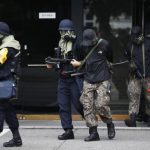BARCELONA, Spain (AP) — A European season of separatist fervor kicked off Thursday with Catalan lawmakers voting on whether to seek the right to hold a referendum on independence from Spain. The EU will be watching closely as Belgium’s Dutch speakers gear up to push for greater autonomy in May elections, and Scotland prepares to hold its own referendum on breaking away from Britain in the fall.

The vote is a milestone in years of mass protests by Catalans, who are fiercely proud of their distinct culture and language, demanding the right to decide whether they want to secede. As lawmakers entered the Catalan parliament in Barcelona on Thursday morning to debate ahead of the vote, dozens of Catalans waved independence flags and a smaller group unfurled Spanish flags, yelling “Catalonia is Spain!”
But the vote is also largely a symbolic one.
Catalonia can ask Spain for permission to hold an independence vote all it wants; Madrid still has the power to say “no” – and it almost certainly will.
Prime Minister Mariano Rajoy has repeatedly said he will not allow a Catalonia secession referendum because Spain’s 1978 constitution doesn’t envision anything but a unified Spanish state, and mandates that referendums affecting Spain must be held nationally and not regionally. He has an absolute majority in Parliament that assures he will prevail, and the main opposition Socialist party also opposes a referendum vote.
Still, the Thursday vote, expected to win easily, could fan the flames of an already impassioned independence drive, especially if it garners the two-thirds majority that supporters are hoping for. A strong separatist message may also inspire independence movements elsewhere in the European Union at a time when European unity has been rocked by economic crisis.
In Spain, the momentum generated by this week’s events will put wealthy Catalonia “into a head-on collision with the Madrid government,” predicted Hugh O’Donnell, professor of cultural politics at Glasgow Caledonian University.
“I think the political temperature in Spain is going to increase very significantly.”
Even if Madrid refuses to allow an independence vote, Catalan politicians might decide to try to hold a referendum anyway. That would put them in perilous legal terrain: When the northern Basque region, where separatist sentiment has also raged, failed to obtain permission for a similar referendum in 2005, Spain said Basque leaders could face jail time if they went ahead and held the vote anyway.
A less extreme scenario would be to use Catalan regional elections as a kind of unofficial referendum, with parties obliged to clearly state where they stand on independence. Under such a situation, any vote for a pro-independence party would be taken as a de facto vote for independence. A big “yes” turnout would give further ammunition to independence supporters to push for a referendum, with or without Spain’s approval.
Even though Catalans know the chance of getting Madrid to let them hold a referendum is virtually nil, they still headed to the streets in Barcelona last weekend, holding noisy protests while waving flags bearing red-and-yellow stripes, a blue triangle and white star symbolizing Catalonia’s independence drive.
Gemma Mondon, a real estate agency administrator from Barcelona, became convinced as Spain’s financial crisis deepened after the 2008 global economic meltdown that Catalonia should strive for independence. She was planning to buy a new independence flag to show her support for a referendum by hanging it from a window in her apartment, replacing the faded one she first put up two years ago.
“In Scotland they are doing the vote and the English government is saying `yes.’ I don’t understand why they are so afraid for us to say out loud what we want,” said Mondon. “We don’t know what the answer is and I think people should have the right to decide.”
The secession question isn’t so easy for Monica Casares, an unemployed events organizer from the Catalan city of Badalona, who wants to be able to vote in a referendum but worries about whether her small children would be better off in an independent Catalonia or as Spanish citizens.
“My husband is `yes’ without a doubt and I am closer to `yes’ than `no’ but it’s a very difficult decision for me,” said Casares. “Many of my friends are for `yes,’ some of my family are `no,’ and I’m in the middle.”
Polls show Catalans overwhelmingly support the right to hold an independence referendum and are roughly evenly split on independence – but that figure drops significantly when people are asked if they favor an independent Catalonia outside the European Union. The European Union and NATO have warned Catalonia it would be excluded if it seceded and would have to reapply for membership.
Catalonia has had a long history of separatist sentiment, especially since its own language and cultural traditions were harshly repressed by Gen. Francisco Franco’s military dictatorship from the end of Spain’s Civil War in 1939 until his death in 1975.
Despite sharing cultural traits with the rest of Spain, many Catalans take pride in deep differences based on their language, spoken side-by-side with Spanish in the area that has a 23 percent unemployment rate compared to Spain’s national rate of 26 percent. And separatists make their views known at home games for the famed Barcelona soccer team, chanting in Catalan for independence and waving their flags.
Artur Mas, the regional president of Catalonia, began pushing for the referendum after he failed to clinch a better financial pact for Catalonia with the central government in 2012 following a massive demonstration across Catalonia a year earlier in favor of a secession vote that energized independence supporters.
Catalonia is one of the country’s most powerful regions and represents roughly a fifth of Spain’s 1.1 trillion euro ($1.5 trillion) GDP. Its population of 7.5 million is greater than those of EU members such as Denmark, Ireland or Finland.
Other Spaniards are keenly aware of the blow Catalan independence would inflict to a nation already struggling with economic devastation.
In Madrid, Jesusa Pollan said it would be unfair to Spaniards to let the Catalans alone vote on their own future.
“Either we all vote, just like the Constitution says, and we do whatever we all decide,” said Pollan, “or they have no right at all to vote on their own.”
—
Clendenning reported from Madrid.





